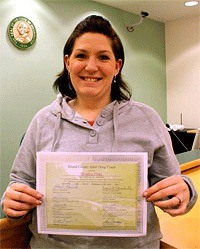Monica Field became a mother when she was 16, dropped out of school, became addicted to heroin and methamphetamine, and got involved with an abusive boyfriend.
The South Whidbey resident, now 26, eventually lost custody of her three children. She stole a checkbook and forged checks. She ended up in jail, accused of 14 felonies and facing seven and a half years in prison.
Then something happened. She entered Island County’s adult drug court and, with the help of a great deal of supervision, counseling and some very tough love, completely transformed her life.
“Everything had changed,” she said. “I’m a woman, I’m a mother, I’m going to be a wife. I’m no longer just some crazy girl walking down the street high on drugs. I can’t even see that girl anymore.”
Field has become a poster child of sorts not just for drug court, but for the notion that a justice system can do more than just punish and warehouse offenders. The program brings together people from four corners of the law and justice community to help substance abusers save themselves, and in doing so, spare the community a great deal of resources in the long run.
A number of misty-eyed law-and-justice officials and other well-wishers filled a courtroom last Thursday for Field’s graduation ceremony. She successfully made it through the two-year adult drug court program. Her record was swept clean of all charges, though she still has to pay restitution.
Some folks, including Field herself, expressed joyful surprise at the fact that she made it through.
In an interview, Andrew Somers, the adult drug court coordinator, said he was somewhat skeptical of Field’s chances of completing the program because of her “very long history” of drug abuse and a seemingly recalcitrant attitude.
“Monica was what I would call a drama queen,” Superior Court Judge Vickie Churchill said during the graduation. “She has such a big heart, but didn’t know how to say no to people, especially people who shouldn’t be in her life.”
Field said the turning point in her life came when Somers and Channing Grevig, another drug court coordinator, visited her in jail and, in very strong terms, told her to get her life together, warning her that she would end up in prison unless she got clean.
People are eligible for drug court if they’ve committed non-violent crimes and have been diagnosed with drug or alcohol abuse problems. The goal of drug court is to reduce recidivism among participants. Not only does that save individuals from a lifetime of hardship, but drug courts save the community from the high costs associated with crime.
Adult drug court was Field’s last shot.
Field said she was at a low point among many low points. The state had taken her children. She had no job and nowhere to live. She was dealing with the death of a loved one. She was in a terribly abusive relationship; she said she had 14 fractures to her face.
Like many drug court participants, Field started out at an in-patient treatment center before moving back to the community. Then the hard work began.
The drug court, Field said, provided her with structure for the first time in her life. She was held accountable for her actions, also for the first time. She had to successfully complete treatment for drug dependency. She submitted to random urinalysis tests. She had to attend drug court hearings and answer tough questions. She worked three jobs at one point and made restitution payments.
At the same time, Field went through family treatment court, which is similar to drug court, but is a civil program designed for parents with substance abuse problems who want to regain custody of a child. She completed the program and regained custody of her 4-year-old son.
Field said the future looks bright. She has the love and support of a new network of friends. And she’s marrying her fiance, Bryon Shuler, in April. “She’s a success story,” Churchill said. “She’s someone who’s put her life back together.”



